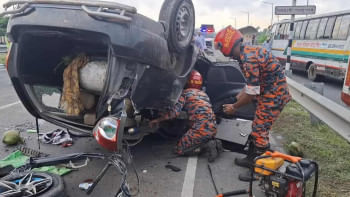Digital database sought
 Participants at a policy dialogue titled “National Digital Database on Violence against Women: An Essential Tool for Effective Services” organised by United Nations Development Programme Bangladesh at The Daily Star Centre in the capital yesterday. Photo:Star
Participants at a policy dialogue titled “National Digital Database on Violence against Women: An Essential Tool for Effective Services” organised by United Nations Development Programme Bangladesh at The Daily Star Centre in the capital yesterday. Photo:Star
Speakers at a policy dialogue yesterday suggested a national digital database on violence against women to reduce the social crime in the country.
They said aside from providing necessary information to bring justice for the victims, the database will be useful to the policymakers and academic institutions for research.
The dialogue titled “National Digital Database on Violence against Women: An Essential Tool for Effective Services” was arranged by United Nations Development Programme Bangladesh at The Daily Star Centre in the capital.
Majeda Haq, programme analyst, Poverty Reduction Cluster, UNDP, during the keynote presentation said several steps would be followed to collect data. The primary data would be collected from violence against women awareness groups working at grassroots level and the credibility of the data would be checked by NGOs in consultations with the groups.
“Designated government and non-government officials would input the data, which would eventually be uploaded in the website of the Ministry of Women and Children Affairs,” she said.
Representatives from government, non government and development organisations and research institutions participated at the dialogue.
Bangladesh ranks 111 out of 186 countries as per UNDP's Gender Inequality Index of 2012, said Majeda.
Addressing as chief guest, State Minister for Women and Children Affairs Meher Afroze Chumki said Bangladeshi women have become more empowered now than before and for this to continue the government needs to work with private and other organisations.
Women and Children Affairs Secretary Tariq-ul-Islam said at present the government collects data regarding violence against women through its Nari Nirjaton Protirodh Cell.
“Newspaper cuttings and phone calls on the hotline (10921) are other primary sources, but the national digital database would be more helpful for taking rapid action,” he added.
Dr Salehuddin Ahmed, managing editor of The Daily Star, moderated the policy dialogue and Pauline Tamesis, UNDP country director, among others, spoke.

 For all latest news, follow The Daily Star's Google News channel.
For all latest news, follow The Daily Star's Google News channel. 



Comments